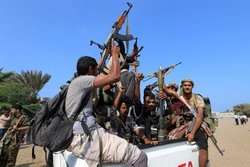 United Nations Special Envoy for Yemen Martin Griffiths says “substantial progress” would be needed before more talks can be held to build on a ceasefire recently agreed by the warring parties in Sweden and to reach a final deal to end the war.
United Nations Special Envoy for Yemen Martin Griffiths says “substantial progress” would be needed before more talks can be held to build on a ceasefire recently agreed by the warring parties in Sweden and to reach a final deal to end the war. RNA - Griffiths briefed the UN Security Council after he had met with Yemen’s former Saudi-backed government officials, including former President Abd Rabbuh Mansur Hadi and members of the ex-parliament in the Saudi capital, Riyadh, on Tuesday, after holding talks with leaders of the Houthi Ansarullah movement in the capital Sana’a.
"Both sides have largely adhered to the ceasefire and there has been a significant decrease in hostilities," Griffiths told the UNSC on Wednesday by video-conference from Amman.
However, he stressed that he and the warring parties shared the view that "substantial progress, particularly on Hudaydah, is something we would like to see before we reconvene the next consultations."
"I am still hopeful that we can proceed to a next round of consultations within the near future and I am working with both parties to make sure that that will happen at the earliest possible date," Griffiths added.
The UN is proposing to bring the warring sides together again for a new round of talks later this month, probably in Kuwait.
The UN special envoy added that talks are ongoing on a redeployment of forces from Hudaydah, providing security in the city and opening up humanitarian access routes.
Hudaydah, a lifeline for millions of Yemenis, has seen some of the heaviest fighting in the Saudi-led aggression, which began in March 2015.
Saudi Arabia and the United Arab Emirates launched the Hudaydah offensive in June but have been facing strong resistance from Yemeni armed forces — led by the Houthis — as well as the city’s residents.
The UN Security Council (UNSC) is considering the creation of a new observer mission to Hudaydah, which will be tasked with monitoring a ceasefire recently agreed by the warring parties and the pullout of rival forces from the flash point.
Ansarullah delegates and Hadi loyalists held a round of peace negotiations in Rimbo, north of the Swedish capital city of Stockholm, last month. The talks resulted in the announcement of a break-through agreement.
The document includes three provisions: a ceasefire along the Hudaydah front and the redeployment of armed forces out of the city and its port; an agreement on prisoner exchange; and a statement of understanding on the southern Yemeni city of Ta’izz.
A meeting will be held in the Jordanian capital next week to follow up on an agreed prisoner exchange that could pave the way to an airlift of "many, many thousands" of detainees from both sides.
Saudi Arabia and a number of its regional allies launched a devastating military campaign against Yemen in March 2015, with the aim of bringing former Hadi’s government back to power and crushing the country’s Houthi Ansarullah movement.
According to a new report by the Armed Conflict Location and Event Data Project (ACLED), a nonprofit conflict-research organization, the Saudi-led war has so far claimed the lives of around 56,000 Yemenis.
The Saudi-led war has also taken a heavy toll on the country’s infrastructure, destroying hospitals, schools, and factories. The UN has already said that a record 22.2 million Yemenis are in dire need of food, including 8.4 million threatened by severe hunger. According to the world body, Yemen is suffering from the most severe famine in more than 100 years.
A number of Western countries, the US and Britain in particular, are also accused of being complicit in the ongoing aggression as they supply the Riyadh regime with advanced weapons and military equipment as well as logistical and intelligence assistance.
847/940